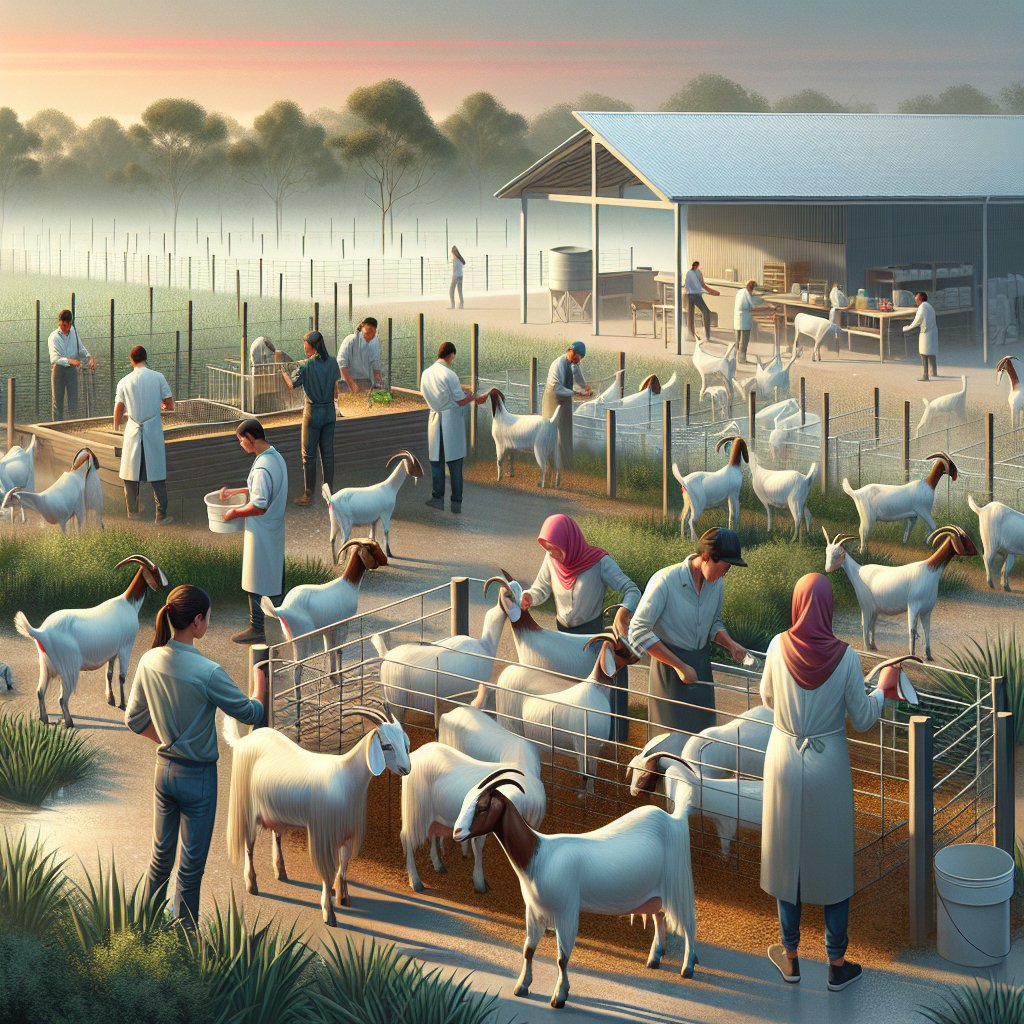Starting a goat farming business can be a rewarding venture, offering both financial and personal satisfaction. Goats are versatile animals that provide milk, meat, fiber, and even companionship. However, like any agricultural endeavor, goat farming requires careful planning, knowledge, and dedication. This article will guide you through the essential steps to establish a successful goat farming business, from selecting the right breed to managing your herd effectively.
Understanding the Basics of Goat Farming
Before diving into the specifics of goat farming, it’s crucial to understand the basic requirements and characteristics of goats. Goats are hardy animals that can adapt to various climates and terrains, making them suitable for different farming environments. They are social creatures that thrive in groups, so it’s important to plan for a herd rather than individual animals.
Choosing the Right Breed
The first step in starting a goat farming business is selecting the right breed for your goals. There are several breeds of goats, each with unique characteristics and purposes. Some popular breeds include:
- Dairy Goats: Breeds like Saanen, Nubian, and Alpine are known for their high milk production. If your primary goal is to produce goat milk, these breeds are ideal.
- Meat Goats: Boer goats are the most popular meat breed, known for their rapid growth and excellent meat quality. If you’re interested in meat production, consider starting with Boer goats.
- Fiber Goats: Angora and Cashmere goats are prized for their luxurious fibers. These breeds require specific care to maintain the quality of their coats.
- Companion Goats: Miniature breeds like Nigerian Dwarfs and Pygmy goats are often kept as pets or for small-scale milk production.
Consider your local climate, available resources, and market demand when choosing a breed. It’s also beneficial to visit local farms and speak with experienced goat farmers to gain insights into the best breeds for your area.
Setting Up Your Farm
Once you’ve chosen a breed, the next step is setting up your farm. This involves preparing the land, constructing shelters, and ensuring a reliable water source. Goats require adequate space to roam and graze, so plan for at least 10-15 square feet per goat in a barn or shelter, and additional pasture space for grazing.
Fencing is a critical aspect of goat farming. Goats are curious and agile animals that can easily escape if the fencing is inadequate. Invest in sturdy, high-quality fencing to keep your goats safe and secure. Electric fencing can be an effective deterrent against predators.
In addition to shelter and fencing, you’ll need to provide a clean and consistent water supply. Goats require fresh water daily, and automatic waterers can help ensure they have access to water at all times.
Managing Your Goat Herd
Effective herd management is essential for the success of your goat farming business. This includes feeding, health care, breeding, and record-keeping.
Feeding and Nutrition
Proper nutrition is vital for the health and productivity of your goats. Goats are ruminants, meaning they have a specialized stomach for digesting fibrous plant material. A balanced diet for goats includes:
- Forage: Pasture and hay should make up the majority of a goat’s diet. Ensure your pasture is free of toxic plants and provides a variety of grasses and legumes.
- Grain: Supplementing with grain can provide additional energy and nutrients, especially for pregnant or lactating does and growing kids.
- Minerals: Goats require specific minerals, such as calcium and phosphorus, for optimal health. Provide a mineral block or loose minerals formulated for goats.
- Water: Always ensure your goats have access to clean, fresh water.
Monitor your goats’ body condition and adjust their diet as needed. Overfeeding can lead to obesity and health issues, while underfeeding can result in poor growth and production.
Health Care and Disease Prevention
Maintaining the health of your goat herd is crucial for preventing disease and ensuring productivity. Regular health checks, vaccinations, and parasite control are essential components of goat health care.
Work with a veterinarian experienced in goat care to develop a health plan for your herd. This plan should include:
- Vaccinations: Common vaccinations for goats include those for clostridial diseases and tetanus.
- Parasite Control: Goats are susceptible to internal and external parasites. Implement a deworming schedule and practice rotational grazing to minimize parasite load.
- Hoof Care: Regular hoof trimming is necessary to prevent lameness and other hoof-related issues.
- Biosecurity: Implement measures to prevent the introduction of diseases, such as quarantining new animals and controlling visitor access to your farm.
Early detection and treatment of health issues can prevent the spread of disease and reduce losses. Keep detailed records of health treatments, vaccinations, and any illnesses within your herd.
Breeding and Kid Management
Breeding is an integral part of goat farming, whether you’re raising goats for milk, meat, or fiber. Understanding the reproductive cycle of goats and managing breeding effectively can enhance your farm’s productivity.
Goats are seasonal breeders, with most breeds coming into heat in the fall. The gestation period for goats is approximately 150 days, resulting in kids being born in the spring. To manage breeding effectively:
- Select Quality Breeding Stock: Choose healthy, high-quality bucks and does with desirable traits for breeding.
- Monitor Heat Cycles: Keep track of your does’ heat cycles to plan for breeding. Signs of heat include increased vocalization, tail wagging, and mounting behavior.
- Provide Proper Nutrition: Ensure breeding does receive adequate nutrition to support pregnancy and lactation.
- Prepare for Kidding: Set up a clean, safe area for does to give birth and monitor them closely during the kidding process.
After birth, ensure kids receive colostrum within the first few hours, as it provides essential antibodies and nutrients. Monitor their growth and health, and provide vaccinations and deworming as needed.
Marketing and Selling Your Products
Once your goat farm is established and your herd is thriving, the next step is marketing and selling your products. Whether you’re selling milk, meat, fiber, or live animals, effective marketing strategies can help you reach your target audience and maximize profits.
Identifying Your Market
Understanding your target market is crucial for successful sales. Consider the following factors when identifying your market:
- Product Demand: Research the demand for goat products in your area. Are there local markets for goat milk, cheese, meat, or fiber?
- Consumer Preferences: Understand the preferences and needs of your potential customers. Are they looking for organic or specialty products?
- Competition: Analyze the competition in your area. What are other goat farmers offering, and how can you differentiate your products?
Once you’ve identified your market, tailor your products and marketing strategies to meet their needs and preferences.
Developing a Marketing Strategy
A well-planned marketing strategy can help you reach your target audience and increase sales. Consider the following marketing tactics:
- Branding: Develop a strong brand identity for your farm, including a logo, website, and social media presence.
- Direct Sales: Sell your products directly to consumers through farmers’ markets, farm stands, or online platforms.
- Wholesale: Partner with local grocery stores, restaurants, or co-ops to sell your products in bulk.
- Value-Added Products: Consider creating value-added products, such as goat cheese or soap, to increase profitability.
Engage with your customers through social media, newsletters, and farm events to build relationships and encourage repeat business. Providing excellent customer service and high-quality products can lead to positive word-of-mouth and increased sales.
Conclusion
Starting a goat farming business requires careful planning, dedication, and a willingness to learn. By understanding the basics of goat farming, managing your herd effectively, and developing a strong marketing strategy, you can build a successful and sustainable business. Whether you’re interested in producing milk, meat, fiber, or simply enjoying the companionship of goats, this rewarding venture offers numerous opportunities for growth and fulfillment.



